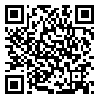1. Doyle AD , H Liesel ,Copeland B, Donna Bush A, Linda Stein A, Scott Thompson A. course for nurses to handle difficult communication situations. A randomized controlled trial of impact on self-efficacy and performance. Patient Education and Counseling 2011;82 : 100–109.
2. Pike T, O’Donnel V. The impact of clinical simulation on learner self-efficacy in pre-registration Nurse. Nursing Education Today 2010;30: 405–410.
3. Aghajani S, Khormaee F, Rajabi S, Rostamoqli khiavi Z. [The relationship of self-esteem and self-efficacy to mathematical anxiety in students]. Journal of School Psychology 2012; 1(3):6-26. [Persian].
4. Brouwer S , Reneman MF, Bu¨ltmann U, Jac JL. Klink v , Groothoff JW.A Prospective Study of Return to Work Across Health Conditions: Perceived Work Attitude, Self-efficacy and Perceived Social Support. J Occup Rehabil 2010;20:104–112.
5. Zahrakar K,Rezazadeh A,Ahghar G. [Effect of self-efficacy on students' problem-solving skills training students in Rasht city schools]. New Journal of Educational Sciences 2010;5(3):133-150. [Persian].
6. Saeid N, Mehrabi M. [ Effectiveness of Teaching Cognitive and Metacognitive Strategies on Strengthen their, Student Self-Directed Learning Readiness and Self Efficacy]. Media 2013; 4 (3):29-39. [Persian]
7. Saffari M, Sanaeinasab H, Rshidi Jahan H, Purtaghi Gh.H, Pakpour AH. [ Happiness, Self-efficacy and Academic Achievement among Students of Baqiyatallah University of Medical Sciences]. J Med Edu Dev 2014; 7 (13) :45-56. [persian]
8. Ashoori J. [ Relationship between self-efficacy, critical thinking, thinking styles and emotional intelligence with academic achievement in nursing Students University]. Scientific Journal of Hamadan Nursing & Midwifery Faculty 2014;22(3):15-23. [persian]
9. Diseth Å. Self-efficacy, goal orientations and learning strategies as mediators between preceding and subsequent academic achievement. Learning and Individual Differences. 2011;21 : 191–195.
10. Safari Y, Karami Matin B, Gharehtappe A, Rezaee M. [The Effect of Teaching Metacognitive Strategies on Students’ Metacognitive Awareness: A Study in School of Health at Kermanshah University of Medical Sciences]. Iranian Journal of Medical Education. 2012; 12(5):356-363. [Persian]
11. Kharazi SA.EjaeiJ,Tabatabaei SM,Karshki H. [The relationship between achievement goals, self-efficacy and met cognitive strategies: Testing a causal model].Journal of psychology &Education 2008;38(3):69-87. [Persian]
12. Jalali M.Poorahmadi E. [Effect of assertiveness training on mental health and self-esteem in adolescents]. Andisheh va Raftar 2010;5( 17):27-36. [Persian]
13. Z Ranjbarkohn Z, MS Sajadinejad MS. [Effect of assertiveness training on self-esteem and depression in students of Isfahan University of Medical Sciences]. Journal of Birjand University of Medical Sciences 2010;17(4):1-8. [Persian]
14. Amidnia E,Abdolkazem N,Soodani M. [Assertiveness and individual- social Adjustment range in female students]. Andisheh &Raftar 2010; 5(17):37-46. [Persian]
15. Alayia Z, Babaei Zad K A, AhmadiGatab T .[Parenting style and self-assertiveness: effects of a training program on self-assertiveness of Iranian high school girls Procedia]. Social and Behavioral Sciences 2011;30:1945 – 1950. [Persian]
16. Sahebzamani M. Nooroozinia R, Ailio L ,Rashidi A. [Effect of assertiveness training on high school students' self-esteem and assertiveness].Medical Journal of Urmia 2010;21(1):48-53. [Persian]
17. Maddahi ME, Liyaghat R, Khalatbari J, Samadzadeh M, Keikhayfarzaneh MM. [Effects of Cognitive Therapy and Training Program on Self-Assertiveness and Parenting Style]. Journal of Basic and Applied Scientific Research 2011;1(12):3376-3382. [Persian]
18. Carroll A ,Gordon L .Self-Efficacy, Academic Aspirations, and Delinquency as Predictors of Academic Achievement in Australian High School Students. In Press: Journal of Adolescence. Available from: http://ssrn.com/abstract=2182384.2010: 1-28.
19. Schwarzer R ,Babler J, Kwiatek P,Schroder K, Zhang JX.The assessment of optimistic self-beliefs: comparison of the German , Spanish and chine's version of the general self-efficacy scale's Applied psychology :an international review 1997;46(1):69-88.
20. Hassan abadi H. [Assessment cognition knowledge beliefs and self-efficacy beliefs in students]. [dissertation]. Tehran .university of Tehran ;2001. [Persian].
21. Fesharaki M, Islami M, Moghimian M, Azarbarzin M. [The Effect of Lecture in comparison with Lecture and Problem Based Learning on Nursing Students Self-Efficacy in Najafabad Islamic Azad University]. Iranian Journal of Medical Education 2010;10(3):262-268. [Persian]
22. Karshki H . [Role of motivation patterns and environment perception in learning self-regulated boy students three grade high schools Tehran city]. [dissertation].Tehran. University of Tehran;2008 .[Persian]
23. Vittorio GC ,Barbarane C,Steca Malone SP.Teacher self-efficacy beliefs as determinates to job satisfaction and students academic achievement :A study at the school level journal of school psychology 2006;44)6(:443-490.
24. Mostafaei A .[Assessment relationship motivation beliefs and self- regulation learning strategies with practice of educati onal in three grade high schools] . [dissertation]. Isfehan .university of Azad Khoorasgan; 2010.[Persian].
25. Bahador motlagh E,Attari Y, Bahador motlagh G.[The Effectiveness of Teaching Cognitive Strategy Skills on Perceived Competence Dimensions in Students].Developmental Pschology: Iranian Psychologists 2012; 9( 33) 39-46. [Persian].
26. Seif A. psychology learning . Tehran. Agah;2006.[Persian].
27. Beirami M. [Assessment effectiveness of education of emotional intelligent on self - assertiveness , students self-efficacy and mental health] . Journal of Tabriz university 2008;11(3):19-36. [Persian]
28. Cacioppo JT and et al. Loneliness with anomological net:an evolutionary perspective. Journal of research in personality 2006; 40:1054-108.
29. Kumar R, Uzkurt C.Investigating the effects of self efficacy on innovativeness and the moderating impact of cultural dimensions. Journal of International Business and Cultural Studies 2011; 1-15.




